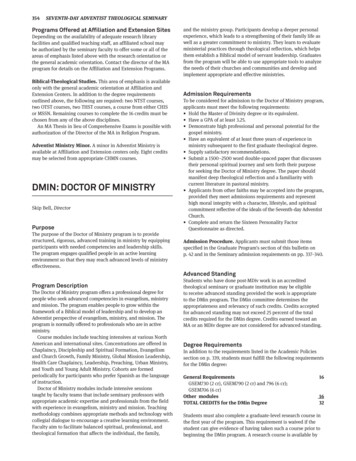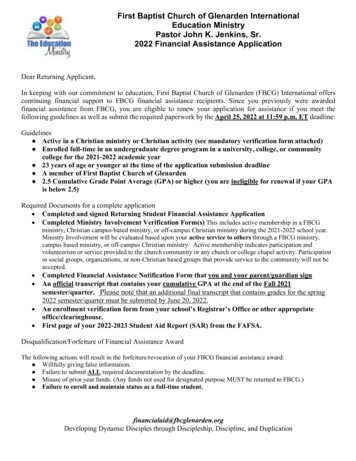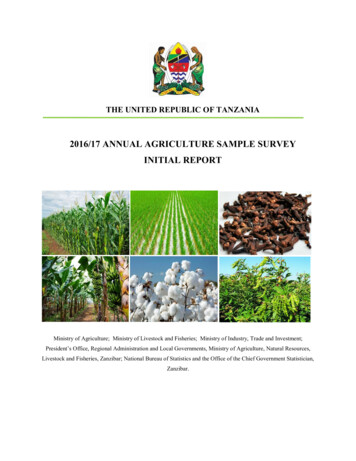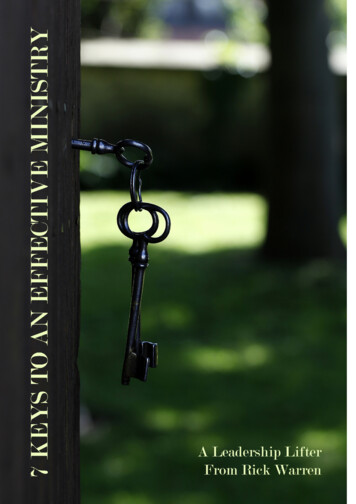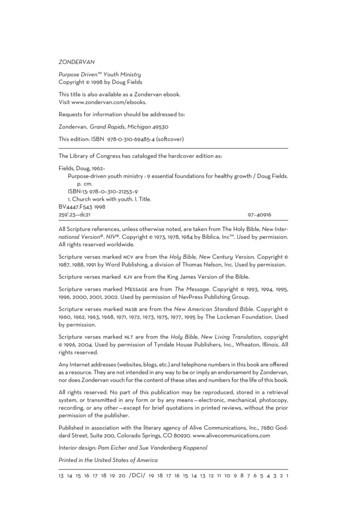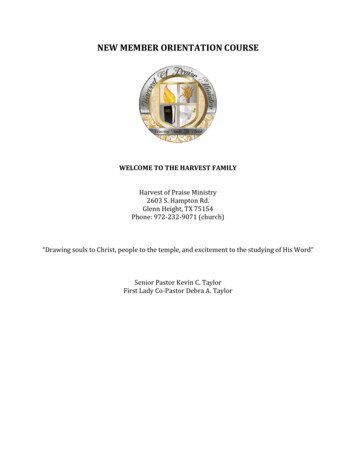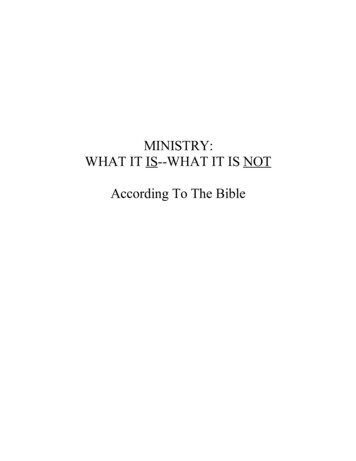
Transcription
MINISTRY:WHAT IT IS--WHAT IT IS NOTAccording To The Bible
MINISTRY: WHAT IT IS--WHAT IT IS NOT According ToThe BibleAsk any Christian what “ministry” is.The answers will vary, slightly, but for almost anyone who has been in church a while, theanswer will be something like this.“Oh, I’m not in ministry--that’s the pastor--he’s in ministry.”or“Ministry--well--God makes some people the clergy--and the rest of us are the lay-people.”or“Ministry is the guy who gives the speeches on Sunday--the pastor. He’s the shepherd and therest of us are the flock. Oh yeah--there are some people who are evangelists--like Billy Graham.”or“Ministry? It means to serve God and we all have a ministry to do. But God has given somepeople the office of ministry. They are the paid, professional, full-time ministers. We have tosubmit to their authority--obey them that have the rule. We all have ministry--but we must besubmitted to a spiritual covering.”Think about it.As a Christian, what is your definition of “ministry”? Does it fit into one of these categories?Have you heard these “buzzwords” used to describe the function of ministry in your church?If we truly let the Bible be our guide--all of these definitions are WRONG!This book is meant to be an open study of ministry. We invite you to open your mind and yourhearts--and most importantly--your Bible.1
Why should you study ministry?Well, you probably have never studied ministry from the Bible, perhaps because you neverthought you were “in it”.Can I tell you a secret? Most people who are “in ministry” have never studied ministry from theBible either!Ministry, as the Bible describes it, is hardly ever taught anywhere. Think about it. When was thelast time you heard a sermon about the subject of apostles? The word apostles is mentioned veryoften in the new testament, but have you ever heard anyone study carefully the methods andpractices of apostles? (perhaps this is because it would so totally disagree with our very welldefined experience and tradition!)Statistic:The word “apostle” is used 78 times in the new testament.The word “pastor” is used once!What does this mean? To me it seems there is something very big in the Bible which has been putdown, reduced and almost destroyed--or perhaps replaced, by something else.Jesus throws a monkey-wrench into our ideas and traditionsLet’s take a first step. Let’s study what “ministry” is NOT.“But Jesus called them to him, and saith unto them, Ye know that they which are accounted torule over the Gentiles exercise lordship over them; and their great ones exercise authority uponthem. But so shall it not be among you: but whosoever will be great among you, shall be yourminister:”(Mark 10: 42-43)Isn’t it just like Jesus to mess up all our nice neat ideas and plans! Look carefully at these verses.Doesn’t it say this:“Ministry is NOT authority over other believers”--?2
Jesus said very plainly that Christian, new covenant ministry is NOT authority (“power-rulership”) over other fellow believers. Ministry is service to others, and specifically NOTauthority over others within the church.A “minister” is a servant--it’s what the word means in the Greek:diakonov diakonos {dee-ak'-on-os}probably from an obsolete diako (to run on errands)one who executes the commands of another, esp. of a master,a servant, attendant, ministerNow you may be saying that Mark 10:42-43 is just one area of scripture--pulled out of context-there must be some place else that says ministry is authority in the church.Okay, then do this. Get out your computer Bible software, or your concordance and look upevery use of the word “minister” or “ministry”. Study them carefully. Not all of them arereferring to Christian ministry. For example in Romans 13 we find.“For he is the minister of God to thee for good. But if thou do that which is evil, be afraid; forhe beareth not the sword in vain: for he is the minister of God, a revenger to execute wrath uponhim that doeth evil.”(Romans 13:4).but read the context!! This area of scripture is speaking about worldly leadership andgovernment--just as Jesus said.”the kings of the Gentiles” (worldly authority).”exerciseauthority one over another. We as believers are to cooperate with worldly authority as much aswe possibly can, unless it contradicts God’s Word.While you are doing that little Bible study, I’d like to mention that Jesus made this samestatement 2 other times in the Gospels.“But Jesus called them unto him, and said, Ye know that the princes of the Gentiles exercisedominion over them, and they that are great exercise authority upon them. But it shall not be soamong you: but whosoever will be great among you, let him be your minister; And whosoeverwill be chief among you, let him be your servant: Even as the Son of man came not to beministered unto, but to minister, and to give his life a ransom for many.”(Matthew 20:25-28)3
“And he said unto them, The kings of the Gentiles exercise lordship over them; and they thatexercise authority upon them are called benefactors. But ye shall not be so: but he that is greatestamong you, let him be as the younger; and he that is chief, as he that doth serve. For whether isgreater, he that sitteth at meat, or he that serveth? is not he that sitteth at meat? but I am amongyou as he that serveth.”(Luke 22:25-27)Now look again at Luke 22. Some people would say that “exercising authority” means cruelty orharshness. They would say that the Bible says that Christian leaders must be “nice people” (andthey are---for the most part). Many people say that the authority of the church leader benefitsthem, so it must be from God and correct. But like it or not, Jesus said that we are not to havebeneficial authority among ourselves--authority over others within the church--in any fashion--isNOT ministry.Well, somebody has to be in charge--right?!Yes, absolutely there is someone who is supposed to be in charge. Someone who has authority,power--rule---over the church.His name is Jesus Christ.Acts 4:11 “This is the stone which was set at nought of you builders, which is become the headof the corner.”1Corinthians 11:3 “But I would have you know, that the head of every man is Christ; “Ephesians 1:22 “And hath put all things under his feet, and gave him to be the head over allthings to the church,”Ephesians 4:15 “But speaking the truth in love, may grow up into him in all things, which is thehead, even Christ:”Ephesians 5:23 “For the husband is the head of the wife, even as Christ is the head of thechurch: and he is the saviour of the body.”Colossians 1:18 “And he is the head of the body, the church: who is the beginning, the firstbornfrom the dead; that in all things he might have the preeminence.”Colossians 2:10 “And ye are complete in him, which is the head of all principality and power:”1Ti 6:15 “Which in his times he shall shew, who is the blessed and only Potentate, the King ofkings, and Lord of lords;”
The risen, glorified Christ is the one Head of the Church. He has all power. He is the Head of allthe church but also the Head of “every man”. He not only rules all believers as a whole, but alsoeach of us individually.Pay particular attention to the last verse listed--1Timothy 6:15. One not often taught! This verserefers to Christ as the “only Potentate”. This is a Greek word which means that Christ is theonly One who has authority over believers. The only One!Every believer has the God-given, Bible based right, to be leaddirectly by Jesus Christ.This leaves no room for hierarchy. There are no “sub-heads”. There are no regional offices, noassistant managers, no vice presidents, no cochairmen.In the new covenant, every believer has the Biblical ordination to be lead directly by God.Ministry is NOT authority over other believers.But non-authority is NOT a “feeling”.You see, in our day and age, most church leaders are really, really, nice people. Most churchleaders will tell you that they work so very, very hard at serving people (and they do--perhapstoo hard!) But that is not the question at hand. As I have said, Jesus was not just giving a “heartattitude” for leadership to strive toward. No. In fact He was simply making a plain statement ofHis idea of operating--His way of functioning with others. He was describing the way hisministry worked.So, the question is this: are we following the system of ministryand operation that the new testament Bible describes?Or, are we following a format of authority that has been handeddown by tradition?5
History LessonThink about the church down the block from yours. You know. “That church”. “Those people”.You know, that strict legalistic church down the block. Maybe the church you used to go to.Those older denominations.Look at what they do. Not the teaching, or how fast the songs are--look at the format at thatchurch, and look at the format in your church.How different are they---really?When you go to church on Sunday, do things go something like this:“We sing some songs of praise to God, and the pastor feeds us the Word.”Get honest. Isn’t this all or most of what you do on a Sunday morning? And isn’t this basicallywhat those older churches do too? And, since this is what we do, isn’t the function of “ministry”being defined by this format? Is the pastor the only person who can speak? Is nearly everythingwe do in our meeting pre-ordained? And don’t we stick with these rules and this format andrepeat it over and over and over?Well, where did this format come from, anyway?History--what we don’t know CAN hurt us!Yet another subject I have never seen studied in church! When was the last time you heard asermon about Christian history? (Probably about as often as we study apostles!)So, study it for yourself!Christian history, all 2000 years of is, is a big awful ugly and beautiful subject. In this littlebooklet we are not going to attempt to study all of it of course. However, we would like to lookat a few key points in history that have a lot to do with where our idea of “ministry” came from.6
The Roman Empire--extreme makeover, church edition.Rome, ruled by the “kings of the Gentiles”.In the 4th century, the church changed drastically. Up to that time, the church had beenpersecuted by the Roman empire (much as it had been in the time of the Bible). But suddenlythere was a huge turn-a-round. The emperor Constantine completely reversed these persecutions.He made it legal to be a Christian and in fact invited Christians to be part of the Romangovernment (remember Jesus’ warning?--apparently the believers of that day did not!). Ofcourse, one could hardly blame the persecuted church of that day! Imagine, one minute they werebeing thrown to the lions, the next they were invited to a party at the emperors palace!Perhaps they believed God had delivered them from the horrible persecutions of the empire.Regardless of what they thought, the well-recorded fact is that the church began to be joined tothe Roman empire, and it’s form of government.A number of years later, another emperor (Theodoscious by name) took another step. He madeChristianity the “official religion” of Rome. This act brought huge change to the structure andoperation of the church.Imagine this:Imagine that today, there was a king of the world who had absolute power (that is just aboutwhat the Roman emperor was). Imagine this king of the world showed up one day in yourchurch and said “I really really like your church. Here’s what I’m going to do. I’m going to makeyour church the one, true, universal church. I’m going to make everyone go to your church--bylaw!”A tempting offer! What if you had no real choice in the matter? Suddenly, the emperor has kickedall the pagans out of their temples, and given them all to you!Imagine. Millions of people are now coming to your church! What would you do? Well,obviously, the church has to get a make-over--and it did--this is a well recorded fact.7
“Masses of people joined the church. Their registration andcare required completely new forms of organization andministry”This is a quote from a catholic history book! (a very honest one indeed!) History records that“ministry” was re-invented in this long ago age, by a very unusual circumstance. This same bookwent on to say that.“Simple apostleship was no longer needed”Well, it made sense, sort of. No need to witness the Gospel out to the world any more, or workin small groups. Everyone was forced to be a Christian.New functions and ministry had to be INVENTED--- and they were.Okay, since everyone is forced to attend church, let’s pick a day for mandatory attendance. Ofcourse the church did not need to do any outreach, just concentrate of ching----teaching----teaching------everyone. Play some nice music whilewe’re at it.“Ministry”--it’s definition and function changed. Somebody had to be in charge over the massesof unlearned people now forced into the church building.The events of the 4th century have been debated over and over again ever since they happened.Many people in that day protested the idea--but in those days, they really had no choice. Theimportant fact for our study is that these events really happened, and if you think they do notinfluence us today, please open your eyes!FACT: in the 4th century the church was changed and ministrywas redefined.8
Well, haven’t things changed since then? Wasn’t there a “reformation” of the church?Yes there was. The times of the reformation make for interesting study. What happened at thistime (15th-16th centuries) was that through much difficulty and resistance (from the organizationof the church!) the Bible was finally translated into common languages and published. At last uscommon folk could get our hands on the Bible. And what has happened ever since, is thatpeople broke away from the existing “authority” of the church to form their own new church.This process keeps going on today--at an ever accelerating pace. Today new church groupssprout up on an almost daily basis.Think about it for a minute. If we are truly meant to “submit to the authority” of churchleadership, shouldn’t we all be catholic? The catholic church is the oldest authority around--so itmust be correct--right? Many millions of catholic folks think this way--what’s wrong with you-”protestant”!Unfortunately, all the new churches that sprout up so frequently, believe they are an authority orrulership! And, then of course, there are the “rules” of function which church groups areultimately drawn toward. A format which is basically the same which was established by theRoman government 1700 years ago.“We sing some songs of praise to God, and the pastor feeds us the Word.”Why do we stick like glue to this format? Isn’t it mostly what we do--over and over and over andover again. How much of our time, effort and money do we expend in this format?Well, if you should dare to question the format--the “order” of things, the pastor will gently puthis arm around you and tell you---”It’s in the Bible.”Is it?9
Ministry AuthorityYes, it’s in the Bible after all--but--where in the Bible?answer: the old testamentFollow this example.Suppose you were a Jew, and you lived in the time before Christ. You had your covenant--youragreement with God. In it, you had laws that were commandments-you know--”thou shalt notsteal”--”thou shalt not covet”--there were a bunch of those commandment laws in the covenant(and these are basically the same for us Christians in the new covenant)The purpose of the commandment laws were to show you where you sinned, where you “fallshort of God’ perfection”Romans 3:23 “For all have sinned, and come short of the glory of God;”These laws proved we are all sinners. So what do you need to do now?2 things.1. Repent--turn away from those sins--don’t continue in them--do your best not to do them anymore.2. But what about the sins that are previously committed? You need to find a way to be cleansedof the sins that you have already done.Romans 3:20 “Therefore by the deeds of the law there shall no flesh be justified in his sight: forby the law is the knowledge of sin.”Sin needs to be understood--and repented of for the Christian also--but--here is the difference-how to be cleansed?If you are a Christian--you know the answer--the blood of Jesus.Romans 3:25 “Whom God hath set forth to be a propitiation through faith in his blood, to declarehis righteousness for the remission of sins that are past, through the forbearance of God;”
How To Pay For SinThe fact is that there has to be a payment made for sin. We as Christians know that Jesus workon the cross was our payment for sin.But you are a Jew, and you live before the time of Christ. What do you do to be cleansed? Whatis your payment for sin?Well, first you need an animal. A certain “clean” animal. You took the animal to the temple inJerusalem (now here is where it gets familiar--watch).This temple was called the “house of God” or the “sanctuary” of God.You entered the temple by the outer courts of praise.You pass in to the inner court of worship. (always start with praise and worship)You dare not enter the sanctuary without this offering--this payment for your sin!In the temple was an altar.On that altar was a priest.This priest was the “delegated, designated, anointed, appointed, God-ordained-authority to dothe ministry of the temple”. This priest was born to the tribe of Levi--the Levitical priesthood.If you were not a Levite, you could not serve God in the temple. The other tribes of Israel wereoften referred to as the “congregation” (the word “congregation” is only found in the oldtestament).[by the way--how many animals did God ask for? “Tithe”. He often asked for 1/10th of certainherd animals or crops--”tithe” was the amount of the sin offering.]Does some of this stuff sound familiar to you?The basis for the format of church operation and the concept of“ministerial authority” comes from the old covenant.11
It’s in the Bible, so we should do it---right?Well, at least that is what most people seem to believe, and Christians have been using these oldcovenant sacrificial laws as the “typology” of the church (and quite repetitively!) for the last1700 years or so. Isn’t it true that an awful lot of our time together is spent making sure that“Sunday service” goes all right?People love to argue that all the Bible needs to be followed and obeyed. These arguments usuallycome from people who never really read the Bible. Some people say these procedures are in helaw and must be fulfilled!Well, when was the last time you sacrificed an animal in your church? Not lately I’m sure! Wellanimal sacrifice (and the offering of grain, etc.) is in the law--why not do it?There is a very simple truth that it seems very few Christian fully understand.Jesus fulfilled the sacrificial laws.Of course we understand this to a degree. We don’t offer animals to God because we know Jesusdid this at the cross--He made a greater offering.“For if the blood of bulls and of goats, and the ashes of an heifer sprinkling the unclean,sanctifieth to the purifying of the flesh: How much more shall the blood of Christ, who throughthe eternal Spirit offered himself without spot to God, purge your conscience from dead works toserve the living God?” (Hebrews 9:13-14)But, it’s as if we do everything else associated with sacrificial law. We have nearly everything weneed to offer and animal, almost including the cutlery! Why should these old covenant sacrficiallaws be used as an operational plan for the new covenant Christian church?12
There are 2 problems with these old covenant procedures being used as operational proceduresfor the new covenant church.1. The new covenant gives us a completely different example to follow. If we are spending somuch time doing this old covenant operation--we are NOT operating by new covenant rules ofmeeting. We might fool ourselves into thinking we are a “new covenant church”. We might preachthe new covenant quite openly--but are we operating by the new covenant definitions of ministryand authority?2. The new covenant says very clearly and specifically that these parts of the old covenant aredone away with.We have studied that Jesus clearly defined new covenant ministry as NOT authority over otherbelievers. The idea that ministry authority is in the Bible, but only in the old covenant.It was only in the Levitical priesthood, and it had nothing to do with new covenant ministry andeverything to do with sacrificial law.The new testament specifically does away with the Levitical priesthood.Hebrews 7:12 “For the priesthood being changed, there is made of necessity a change also of thelaw.”The law is changed. No more Levitical priesthood.The Biblical basis for “pastoral authority” is the Leviticalpriesthood. No one ever teaches this--but it’s true!Everything to do with sacrificial law in the old testament is changed in the new testament.The “house of God” is not the temple in Jerusalem but the heart and home of every believer.1Timothy 3:15 “But if I tarry long, that thou mayest know how thou oughtest to behave thyselfin the house of God, which is the church of the living God, the pillar and ground of the truth.”The “temple” is not a building, again it is in people.1Corinthians 3:16 “Know ye not that ye are the temple of God, and that the Spirit of Goddwelleth in you?”13
There is obviously no need to make offerings.Hebrews 10:18 “Now where remission of these is, there is no more offering for sin.”. giving in the new covenant is Spirit-lead like all the actions of believers.In the new covenant, the priesthood is in every believer.1Peter 2:5 “Ye also, as lively stones, are built up a spiritual house, an holy priesthood, to offerup spiritual sacrifices, acceptable to God by Jesus Christ.” (note that we are to make spiritualsacrifices--not monetary ones!)Revelation 5:10 “And hast made us unto our God kings and priests: and we shall reign on theearth.”Maybe this all seems pretty harmless to you. Well, what else are we Christians going to do? Welove to have big congregational meetings--lots of praise and worship--and have wonderfulteaching from the pastor.These things are all great. And there is a place for large meetings in the new covenant church, andgroup teaching, and worship. But we need to notice something.All these things only benefit us believers---right?They do nothing for the unsaved.The new covenant church has a mission to fulfill, and if we arespending so much of our time, effort and money living outthese old covenant “types” we are NOT doing and operatingand living out new covenant principles.Let’s outline some of these principles, starting with ministry.14
We’ve seen what ministry is NOT--it’s time to see what ministry IS.The Mission.“The Spirit of the Lord is upon me, because he hath anointed me to preach thegospel to the poor; he hath sent me to heal the brokenhearted, to preachdeliverance to the captives, and recovering of sight to the blind, to set at libertythem that are bruised, To preach the acceptable year of the Lord.”Luke 4: 18-19The Gospel is the purpose of the church. It is the highest goalof the ministry of the church.But take a look at Jesus’ mission statement in these verses.1. The Good News--the “free gift” --salvation by faith in the name of Jesus Christ. Jesus died,shed His blood to forgive the sin of all people. He paid the price to save us from Hell. He openedwide the gates of heaven for all who believe. He left us all with the mission to spread this news.“That if thou shalt confess with thy mouth the Lord Jesus, and shalt believe in thine heart thatGod hath raised him from the dead, thou shalt be saved.”(Romans 10:9)It is the first, foremost and ongoing purpose of the church to spread this message, to let peopleknow that Jesus saves.Mark 16:15 And he said unto them, Go ye into all the world, and preach the gospel to everycreature.15
More to the Gospel than you think!“.he hath sent me to heal the brokenhearted, to preach deliverance to thecaptives.”2. Healing. Jesus healed the sick. His followers in the Bible prayed for the sick in His name.Praying for the sick is a Gospel purpose and a purpose for the ministry of the church.3. Deliverance. Jesus cast out the devil. He brought deliverance from every worldly sorrow andpain.“Surely he hath borne our griefs, and carried our sorrows: yet we did esteem him stricken,smitten of God, and afflicted. But he was wounded for our transgressions, he was bruised for ouriniquities: the chastisement of our peace was upon him; and with his stripes we arehealed.”(Isaiah 53:4-5)A ministry purpose of the church is to let people know thatJesus can deliver them from pain and sorrow and cast out thedevil’s strongholds in every way, wherever they are.A mission for all.A ministry for all.16
To whom shall we bring the Gospel?“.to the poor.the brokenhearted.the captives.the blind.themthat are bruised.”4. Feeding the poor.“Then shall the King say unto them on his right hand, Come, ye blessed of my Father, inherit thekingdom prepared for you from the foundation of the world: For I was an hungred, and ye gaveme meat: I was thirsty, and ye gave me drink: I was a stranger, and ye took me in: Naked, and yeclothed me: I was sick, and ye visited me: I was in prison, and ye came unto me. Then shall therighteous answer him, saying, Lord, when saw we thee an hungred, and fed thee? or thirsty, andgave thee drink? When saw we thee a stranger, and took thee in? or naked, and clothed thee? Orwhen saw we thee sick, or in prison, and came unto thee? And the King shall answer and sayunto them, Verily I say unto you, Inasmuch as ye have done it unto one of the least of these mybrethren, ye have done it unto me.” (Mathew 25:34-40)This is certainly a big mission!We as believers need to open our eyes and see the need for theministry of Jesus to be spread--to be revealed in the worldaround us.But how?17
“to set at liberty them that are bruised, To preach the acceptable year of theLord.”Part of Jesus’ mission was a method for carrying on the mission.The Greek of this phrase reads “apostello aphesis” meaning, literally, apostolic liberty. Jesus issaying here that He will, as part of His mission, “set people free so they can preach theGospel”.Now we’ve all read the new testament and we certainly don’t need convincing that Jesus healedthe sick, fed the poor, and cast out the devil--but He also made apostles. Apostles were simplysmall groups that carried on His mission and in fact worked with Him in His mission. He releasedpeople (quickly!--with faith in their ability!) to preach the Gospel.How quick? An example.“And they came over unto the other side of the sea, into the country of the Gadarenes. Andwhen he was come out of the ship, immediately there met him out of the tombs a man with anunclean spirit, Who had his dwelling among the tombs; and no man could bind him, no, not withchains: Because that he had been often bound with fetters and chains, and the chains had beenplucked asunder by him, and the fetters broken in pieces: neither could any man tame him. Andalways, night and day, he was in the mountains, and in the tombs, crying, and cutting himselfwith stones. But when he saw Jesus afar off, he ran and worshipped him, And cried with a loudvoice, and said, What have I to do with thee, Jesus, thou Son of the most high God? I adjure theeby God, that thou torment me not. For he said unto him, Come out of the man, thou uncleanspirit. And he asked him, What is thy name? And he answered, saying, My name is Legion: forwe are many. And he besought him much that he would not send them away out of the country.Now there was there nigh unto the mountains a great herd of swine feeding. And all the devilsbesought him, saying, Send us into the swine, that we may enter into them. And forthwith Jesusgave them leave. And the unclean spirits went out, and entered into the swine: and the herd ranviolently down a steep place into the sea, (they were about two thousand;) and were choked inthe sea. And they that fed the swine fled, and told it in the city, and in the country. And theywent out to see what it was that was done. And they come to Jesus, and see him that waspossessed with the devil, and had the legion, sitting, and clothed, and in his right mind: and theywere afraid. And they that saw it told them how it befell to him that was possessed with thedevil, and also concerning the swine. And they began to pray him to depart out of their coasts.And when he was come into the ship, he that had been possessed with the devil prayed him thathe might be with him. Howbeit Jesus suffered him not, but saith unto him, Go home to thyfriends, and tell them how great things the Lord hath done for thee, and hath had compassion onthee. And he departed, and began to publish in Decapolis how great things Jesus had done forhim: and all men did marvel. (Mark 5:1-20)18
Could this man be in a worse condition?! And yet, look at what Jesus does. The man asks tofollow Jesus and Jesus simply tells Him.“Go home to thy friends, and tell them how great things theLord hath done for thee, and hath had compassion on thee.”And the Bible records that this man preached to “Decopolis”--which means ten cities!Do we truly see or understand the miracle of release in the Bible?The release to ministry is a part of the Gospel--a part of themission of the church--a very important part!19
MINISTRY SERVICEWhat IS ministry?If we looked up the word in the Greek we would find that it simply means “servant”.“Ministry”--”minister” ---always means “service”.Certainly this agrees with Jesus’ definition of what ministry is NOT (authority or power or ruleover others)!Who Has Ministry?If you are a Christian, you have God inside of you.I am sure, that at some
Ask any Christian what "ministry" is. The answers will vary, slightly, but for almost anyone who has been in church a while, the answer will be something like this. "Oh, I'm not in ministry--that's the pastor--he's in ministry." or "Ministry--well--God makes some people the clergy--and the rest of us are the lay-people." or

